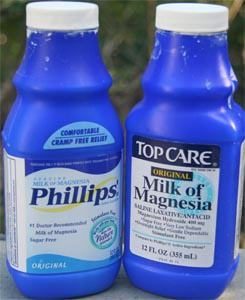
Before there were acid-suppressing drugs there were antacids. For decades, people relied on products such as Alka-Seltzer, Bromo-Seltzer, Amphojel, Di-Gel, Maalox, Mylanta, Rolaids and Tums, to name just a few. Then along came H2 antagonists such as Tagamet (cimetidine) and Pepcid (famotidine). Later proton pump inhibitors (PPIs) like Prilosec (omeprazole), Prevacid (lansoprazole) and Nexium (esomeprazole) made their appearance. Here is a recent question that took us down memory lane. It reminded us that antacids ease reflux surprisingly well.
What’s in Riopan?
Q. While I was visiting Italy, I experienced a dreadful bout of acid reflux. A doctor prescribed an oral medication called Riopan, which I took before bed. It worked remarkably well. I am told you can take it indefinitely without worrying about side effects.
Is this drug available in the United States either by prescription or over the counter? It is the best medication I have taken for this problem.
Antacids Ease Reflux Very Well:
A. Riopan is an old-fashioned antacid that was first developed in Germany. Chemists use its generic name magaldrate because it contains a combination of aluminum and magnesium hydroxides. Magaldrate received a patent in 1960.
Although magaldrate is no longer available in the US, you can get the same basic ingredients in such familiar OTC antacids as DiGel, Gelusil, Maalox and Mylanta.
Milk of Magnesia:
Magnesium hydroxide goes back a lot farther than magaldrate. You have probably heard of Phillips’ Milk of Magnesia. A British pharmacist by the name of Charles H. Phillips invented it. He had immigrated to Elizabeth, NJ, in the mid-19th century.
His product, “Phillips’ Milk of Magnesia” was patented in 1873 for the treatment of digestive problems such as heartburn. It was also an effective laxative. The key ingredient was “hydrate of magnesia” (also known as magnesium hydroxide). It was a giant best seller. The familiar blue Milk of Magnesia bottle is iconic:

Fifty years later, a major pharmaceutical manufacturer, Sterling Products Corp., acquired his company. Phillips’ Milk of Magnesia is still available today under the Bayer logo.
Antacids Ease Reflux Without Diarrhea or Constipation:
Magnesium hydroxide can neutralize stomach acid (hence the name antacid or antiacid). But, as mentioned, it can “loosen” the bowels. That is to say it has anti-constipation (laxative) activity. Too much, though, and you end up with diarrhea.
Drug makers discovered that if they added another antacid, aluminum hydroxide, to the mix, the two ingredients might end up balancing each other out. That’s because aluminum hydroxide is a bit constipating.
So, if you put aluminum hydroxide together with magnesium hydroxide, you might get an antacid effect and the two could cancel out each other’s unwanted gastric consequences. Think of it a bit as if 1+1=0. You don’t get constipation or diarrhea, but the antacids ease reflux.
For decades, brands like Maalox and Mylanta were household staples to ease indigestion. Doctors even prescribed these products to help heal ulcers.
The Aluminum Controversy:
Questions about a connection between aluminum exposure and dementia have been floating around for decades. If you were to put aluminum and Alzheimer’s into a search on the PubMed website (National Medical Library) you would discover over 1,200 articles.
Many articles, including a recent piece in the New York Times (June 9, 2023) titled “Are Natural Deodorants Really Better for You?,” downplay the danger of aluminum. Many writers assume that we absorb very little aluminum through the skin.
We have been researching aluminum toxicity for many years. There is a surprising lack of data on skin absorption (Journal of Applied Toxicology, Nov. 2021). That’s especially true for women who shave their armpits and then apply an aluminum-containing antacid.
How Do You Absorb Aluminum?
An article in the International Journal of Molecular Sciences (April, 2023) points out that people absorb aluminum from food, water, personal care products and antacids:
“As a consequence of using widespread over-the-counter antacids, Al [aluminum] ingestion might exceed that in food and beverages by over 100-fold, although the absorption is usually in the range of 0.01–1%. It was estimated that orange juice could increase Al absorption from antacid drugs by 8-fold and that citric acid increases the intake by up to 50-fold.”
The authors go on to conclude:
“The literature clearly suggests that AD [Alzheimer’s disease], AUD [alcohol use disorder], MS [multiple sclerosis], PD [Parkinson’s disease], and DE [dialysis encephalopathy] patients experience excessive accumulation of Al in the CNS [central nervous system]. Epidemiological links between higher exposure to Al and their increased incidence have been observed in AD, PD, and DE. In AD and PD, the potential use of Al as a disease marker has been noted. Additionally, favorable results of the use of Al chelators [removers] were observed in AD, AUD, MS, and DE. Moreover, cleaning dialysis fluid from Al prevents the development of DE.”
You can read much more about aluminum and neurotoxicity at this link.
Magnesium and Aluminum Antacids Ease Reflux:
We do not think occasional use of an aluminum-magnesium antacid will contribute to Alzheimer’s disease. We do limit our own exposure to aluminum, however.
If we need something for occasional heartburn, we turn to calcium carbonate (Tums, for example). We also like a product such as Pepcid Complete. It contains the H2 antagonist, famotidine. In addition, the antacids calcium carbonate and magnesium hydroxide provide rapid acid neutralizing action.
Learn More:
To learn more about controlling heartburn and other gastrointestinal problems, you may wish to consult our eGuide to Overcoming Digestive Disorders. This online resource is available under the Health eGuides tab.
Share your own experience with heartburn in the comment section below. Have you found that antacids ease reflux?

